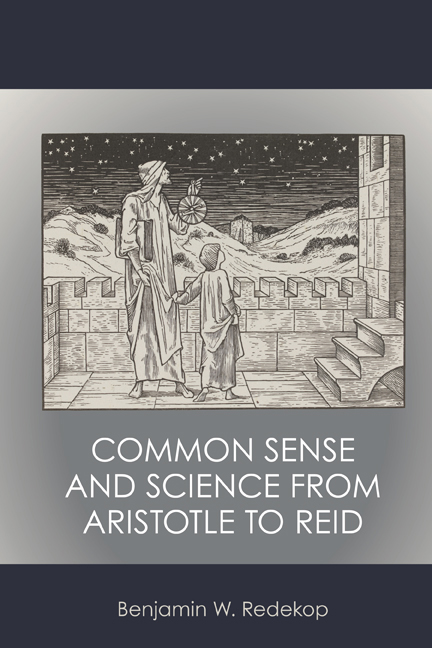Book contents
- Frontmatter
- Contents
- Acknowledgments
- Introduction
- 1 Common Sense and Scientific Thinking before Copernicus
- 2 The Challenge of Modern Science and Philosophy
- 3 Common Notions, Sens Commun: Herbert of Cherbury and Renè Descartes
- 4 Hobbes, Locke, and Innatist Responses to Skepticism and Materialism
- 5 Common Sense in Early Eighteenth-Century Thought
- 6 Common Sense and Moral Sense: Buffier, Hutcheson, and Butler
- 7 Common Sense and the Science of Man in Enlightenment Scotland: Turnbull and Kames
- 8 Common Sense, Science, and the Public Sphere: The Philosophy of Thomas Reid
- Epilogue
- Notes
- Index
- Frontmatter
- Contents
- Acknowledgments
- Introduction
- 1 Common Sense and Scientific Thinking before Copernicus
- 2 The Challenge of Modern Science and Philosophy
- 3 Common Notions, Sens Commun: Herbert of Cherbury and Renè Descartes
- 4 Hobbes, Locke, and Innatist Responses to Skepticism and Materialism
- 5 Common Sense in Early Eighteenth-Century Thought
- 6 Common Sense and Moral Sense: Buffier, Hutcheson, and Butler
- 7 Common Sense and the Science of Man in Enlightenment Scotland: Turnbull and Kames
- 8 Common Sense, Science, and the Public Sphere: The Philosophy of Thomas Reid
- Epilogue
- Notes
- Index
Summary
Thinkers have been pondering the nature of common sense, and its relationship to science and scientific thinking, for a very long time. In the ancient world, “scientific” knowledge (epistêmê in Greek, scientia in Latin) emerged as a counterpoint to everyday understanding and common opinion, until Aristotle produced a reconciliation of the two that set the course for scientific thought for the next two millennia. It was not until the early-modern period, when the New Science of Copernicus, Galileo, and Newton emerged triumphant, that common sense and its relationship to science again became problematic, remaining so to this day. This book is about this fraught relationship and about the early-modern thinkers who sought to address it, culminating in the thought of the philosopher Thomas Reid (1710–1796), the preeminent figure in the Scottish school of common-sense philosophy. It is a story full of fascinating twists and turns but is ultimately about the perennial quest to understand how the human mind is able to gain credible and reliable knowledge about the self, nature, other human beings, and God.
It is my contention that if we can understand the historical interplay between common sense and science, and the emergence of “common sense” as a contested term in scientific and philosophical discourse, we will have a better grasp of some of the fundamental and enduring problems besetting the relationship between science and society, that is, the problem of the public understanding of science. In some parts of the world, including particularly the United States, questions that have been long settled in the scientific community—for example, global warming, evolution by natural selection, the value of vaccines—remain controversial in the larger public arena. A disconcerting gap persists between everyday knowledge and understandings, and well-established scientific theories and facts. While there are many factors—economic, religious, political—contributing to this state of affairs, it builds upon a mismatch between our everyday, commonsensical judgments and intuitions, and the discoveries and methods of modern science. This book helps readers to better understand the fundamental contours of this relationship and why common sense and science may not be at odds after all.
- Type
- Chapter
- Information
- Common Sense and Science from Aristotle to Reid , pp. 1 - 12Publisher: Anthem PressPrint publication year: 2020



